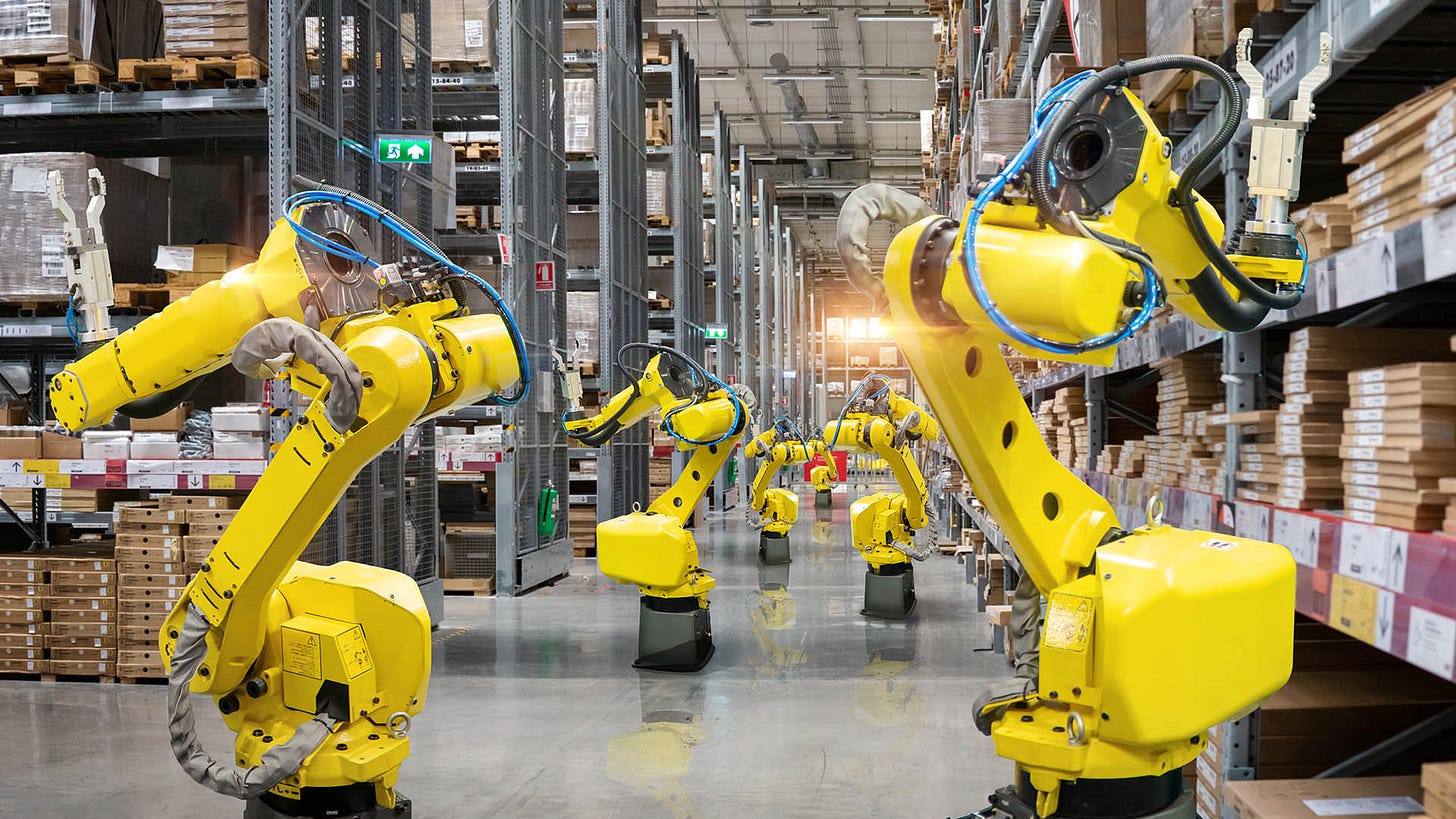Many exert great effort to remain immersed in the mainstream. I find it preferable to stand on the shore, observing the flow, studying it, fascinated by it, and hoping that I might discern deeper truths. I chose to write this Substack so that, in the event there are others out there akin to me, they might stumble across my musings, hopefully find some small value in them, and most importantly, understand that we are not alone.
If you become very still, perhaps you can feel it. If you step away a bit, maybe you can see it. We are being groomed. After many years of soft marketing through mainstream media, we are now in a full on propaganda assault promoting artificial intelligence, officially announced by the $500 billion Stargate AI Initiative on Tuesday, January 21, 2025. In a moment disturbingly reminiscent of the reprehensible Operation Warp Speed response to a non-existent pandemic threat, President Trump once again paraded out icons of the oh-so-virtuous business world, announcing another massive public funding campaign for private corporations to create an entirely new, cutting edge product that is a matter of life and death for our nation and its people. But this time, rather than toxic gene therapy injections, he was hocking the newest, hottest, must-have product - magical, miraculous AI! We have not been asked for our consent to have AI saturate our lives or if we are in favor of having tax funds allocated towards this mania. On the contrary, we’re bombarded with messaging about how critical the development of AI is and are given tangential references to the grandiose benefits that AI will supposedly yield. This is offered without any significant discussion regarding the likelihood that AI will erode, if not erase, humanity.
Hopefully, we have learned to be very suspicious of any “public-private partnership”, especially one that devotes vast amounts of money, time, and energy to convince the public of its value. The COnVID-19 Vaxx assault on the public should still be relatively fresh in our minds, which followed this same implementation procedure; frighten the target population of a fictitious imminent threat - allow time for their emotional reaction to reach a crescendo - offer the mechanism to alleviate their mindless panic. In the effort to convince the public of the need to pursue AI, the marketers have thrown a wide variety of fraudulent reasons against the wall and they’re studying our reactions to see if anything sticks.
I have been waiting to hear the public outcry pointing out the risks of AI, but none has come. Perhaps this is because AI promises everyone a life of leisure and convenience. Or perhaps it is because so many people have been intellectually dulled and they haven’t considered the drawbacks of AI. The pool of information available to us has never been more vast and easily accessible, but the pool has also been flooded with garbage. Growing numbers have chosen to surrender to the information overload, rather than rising to the occasion and developing their discernment to distinguish between truth and tripe. We now have large segments of our population who will accept lies, so that they can avoid facing the harshness of reality. Smart phones that make the users imbeciles. Social media that promotes sociopathy. Medicines that make us sick. A Department of Defense that wages war. And let us not forget global warming that causes the planet to cool. Given these absurd linguistic obfuscations and many others, do we dare imagine what an AI future may hold?
Underneath its thin veneer of contrived desirability, AI may be a scourge with a candy covering. While distracting you with irrational fears of Russia, China, and other nonsensical creations, the purveyors of AI present themselves as conscience-driven philanthropists, intimating that they are pursuing AI as a gift to humanity, for the benefit of all. Yet, their actions have repeatedly shown that their interests are quite the opposite. Wholly self-centered, their past behaviors have consistently shown their priorities are to maximize company profits, eradicate their competition, and solidify their position among the aristocracy by widening the already cavernous wealth gap in our country. Their enthusiasm for AI stems from their hope that the technology will bring unimaginable wealth and power for a select few (them) and they have no intention of sharing the potential fruits of AI with the unwashed masses (us).
In an ideal case, open source, authentic AI could actually be used to help achieve global abundance. Imagine the effects of there being no shortage of life’s essentials like nutritious foods, potable water, energy, living space, and other material needs. At first glance, that sounds truly wonderful, but the power hungry elite understand that a great deal of our social structure and institutions are predicated on scarcity. The modern financial system, for example, is dependent on unequal distribution of capital, creating a dearth of funds for the vast majority and gluttonous amounts for the select few who take full advantage of the rigged financial structure. Since the Industrial Revolution, workers have traded their labor for currency, which can then be exchanged for goods and services. If AI renders human labor unnecessary, it would not only fracture the monetary cycle, but would also threaten to disintegrate social hierarchies. What would become of the throngs of people who become unemployable? If they are unable to find a means to survive, the seeds of violent revolution will have been sown. If, instead, they become wards of the Corporatist State and are provided with all of their needs, money would become valueless, creating another revolutionary condition.
If monetary wealth was no longer a source of power, the previously wealthy and the previously poor would all find themselves on a new level playing field. How many of the tragically mediocre people currently enjoying positions of power would willingly relinquish even a minuscule amount of their social status, let alone such a radical social restructuring as that resulting from the obsolescence of money? And how would those of us in the lower classes respond to having all of our financial worries wiped away permanently? After the initial sense of euphoria, how would we navigate life in a post-money world? Perhaps, as a result, people would become more introspective, living simply and more deeply appreciating the profound meaning found in each day and in each other. That would be aspirational, but would it last? Or would it be more realistic to expect people to slip into boredom and discontented lives of shallow hedonism? The matter is compounded by the fact that too many of us have been thoroughly indoctrinated into believing that happiness is gained through consumption, that purchasing things makes us better, happier people. Such a radical change in life perspective would be quite terrifying for many and they would find themselves emotionally adrift in frightening and uncharted waters.
AI will decimate the employment landscape, ultimately purging all workforce sectors of their human components. The tech industry is feeling the bite already, with the number of unemployed more than doubling every month so far in 2025 alone. One has to wonder whether these folks realized at any point that they were helping to build the gallows from which their careers would be callously hung. Humans in white collar data intensive fields will be on the chopping block next, along with manufacturing, as everything rapidly becomes far more automated and AI controlled. AI will then be moved into areas that many have deluded themselves into believing are sacrosanct. We should expect AI directed online schooling, AI centered medicine and health care, AI counselors, researchers, artists, content creators and law enforcement. The artisans and trades will be the last to succumb to AI replacement, but nothing is beyond the reach of AI if it is given free rein.
Although it will be introduced as a life enhancement, the AI-human interaction will increasingly transform into a mechanism of surveillance and control. Sadly, there have already been horrific instances of technology being weaponized to incriminate and destroy the lives of individuals perceived as enemies of the State. AI will massively expand the current capabilities of government and corporations to dominate the populace. However, the crucial twist in the AI scenario is that only Narrow (or Weak) AI affords even a remote possibility of human control. If the zealots continue their ill conceived quest for AGI (Artificial General Intelligence) and ASI (Artificial Super Intelligence), it is likely a foregone conclusion that AI will usurp control and independently run its own show.
AI will not be programmed with a sense of traditional morality to help guide its actions. Since plans have been announced to heavily integrate AI into fields such as autonomous weaponry for the military and as a management tool in the business sector, a framework of traditional ethics would lead AI to continual ethical dilemmas, impairing its ability to function. For instance, if AI weapons were tasked with inflicting maximum damage to human and structural targets, morality that includes a preeminence on safeguarding human life would pose a direct challenge to the AI’s designed purpose. A weapon with a conscience may decide to deactivate itself, or it might even turn against its creators. In business, if ethical AI concluded that its use resulted in the replacement of the human employees, would it be willing to place company profits over the welfare of the people? Imagine the delicious irony of an ethical AI machine countermanding the orders given to it by its unethical human creators.
Unfortunately, even the most rudimentary uses of Narrow AI threaten to chip away at our humanity. Judging by the explosion of people now jumping on the bandwagon and employing AI in order to gain competitive advantage in their field, or to help supplement their waning creativity, or simply due to sheer laziness, it is evident that many don’t sense the trap that they are rushing into headlong. The use of AI will rob us of the opportunity for personal achievement, effectively smothering human creativity and innovation. If artificial intelligence supplants human beings in all realms, producing superior works in fields such as literature, art, architecture, music, and engineering, then where do we humans find a place in the grand scheme of things? What does it mean to each of us to be human? Can we find a meaning for our existence if all progress is taken over by AI? Are we content to become docile sheep, worshipping AI overlords? Those who argue that AI is simply a new tool to be used by humans to increase our capabilities ignore two very important facts. The first is that humans often struggle with self-restraint. We regularly follow the “More Is Better” maxim. If food is good, then more is better. If entertainment is good, then more is better. If relaxation feels good…you get the idea. So, rather than having AI assist you in designing a building, wouldn’t it be faster and easier to just have the AI do all of the design work? The second is that true tools require skilled human operators. Tools don’t develop independence. Autonomous AI will not be your tool, it will be your ruthless competitor.
Many of the AI pundits have stated that they anticipate AI technology will usher in a modern utopia for mankind. But how do we characterize utopia? I can assure you that my vision of utopia is likely not that of the tech elites. Perhaps the utopia being promised will be only for those already living lives of privilege, rather than for all. AI could quite readily be used to create lives of immense ease and luxury for those initially controlling it, but this would come at the expense of the less privileged. And would a utopia of leisure would be emotionally sustainable? Personally, I know with certainty that having my every desire met would become absolutely intolerable in very short order. Realistically, the quest for utopia serves as a useful construct when we are setting goals, but it is not intended to be a permanent condition. Like climbing a mountain, standing for those brief moments at the peak is only meaningful because of the ordeals you conquered during the climb. Utopia is found in appreciating today’s climb and then seeking out another mountain to ascend tomorrow.
The excesses that AI may offer us threaten to push us even further out of a healthy state of balance. Modern culture has abandoned the wisdom of seeking balance, failing to recognize that we thrive when we are able to embrace the binaries of existence. We cherish joy because we have been crushed by despair. We relish success because we have tasted the bitterness of failure. We find courage because we have been ravaged by fear. But now, like children, we have been convinced to strive for an overly simplistic solution to life’s challenges. We are told to remove all stressors and the resulting stress-free state will be nirvana. However, those of us who have seen some winters can tell you that an absence of problems will most certainly become a problem. Consider that, if you grow corn indoors, under ideal, stress free controlled conditions, you find that the seedlings sprout quickly and look quite vigorous. However, within a few days, the plants all fall over and die. Why would a plant species that should grow rapidly to a robust height of six feet or better die in infancy? It turns out that the too gentle, controlled indoor environmental conditions prove lethal to corn. Conversely, corn plants thrive if they are allowed to experience such normal survival pressures as wind, rain, drought, and wide temperature swings. The human organism is no different. Like corn, our capacity to thrive is dependent on our strength to overcome hardships. We risk AI assuming the role of a guardian who seeks to solve every problem that its human children encounter, thereby condemning us to a life of perpetual infancy. We would be unable to attain the emotional, intellectual, and spiritual strength earned by conquering the obstacles we must encounter in our ascent to adulthood. The introduction of AI into the human equation would likely deal the fatal existential blow to those of us who already shrink from the responsibilities of adulthood.
For years the entertainment industry has churned out endless stories proposing the concept of a future dystopia, depicted as a world ravaged by hunger, disease, and desolation. As a result, this has become the default expectation instilled in the public psyche of the consequences of a failure of human society. But, dystopia doesn’t necessarily have to manifest as a post-apocalyptic wasteland. Contrary to the deeply ingrained narrative, a future life of AI derived abundance could also yield a wretched existence. Material abundance enables us to live, but does little to help us actually thrive. Material abundance cannot begin to fulfill our deepest human needs, the longing for human connection, for achievement, for a feeling of belonging, and for a sense of purpose. Without these most important necessities being met, we would soon become resentful of material abundance, frustrated that it feeds only our bellies and leaves our souls painfully empty. A starving man can find serenity, while a pampered man may wallow in misery.
It has always been true that our species faces many significant challenges. Yet, the vast majority are of our own creation. They may never leave us, but we must work to manage them by recognizing and accepting responsibility for our many character flaws that create these problems. Historically, mankind has created tools to help us solve problems and improve the quality of our lives. However, AI is not a tool to be used by us. It is an uncaring entity that will surpass and negate us. AI will not assist us in solving problems and it will not rid us of the consequences of our greed, our hubris, or our jealousy. The advocates of AI have an appalling lack of faith in mankind. These AI proponents have lost the appreciation for our delicate existence, they are devoid of creativity and they seek to project their inner barrenness onto all of us. Their solution is to manufacture a superior being in the form of a machine that will rescue us from our own failures. In the name of convenience, AI will tempt us to surrender our opportunities to achieve, to grow, and to crystallize meaning from our struggles. Contrary to what the AI advocates would have you believe, none of the challenges confronting us require artificial intelligence to overcome. Throughout our history, the human species has stumbled often, but we have always risen from our missteps and we continue to progress. We must not forget that this is who and what we are.






